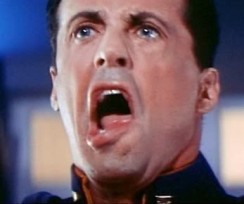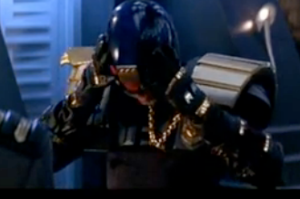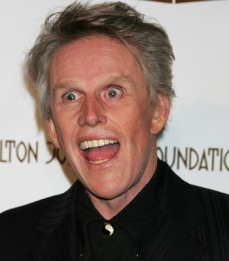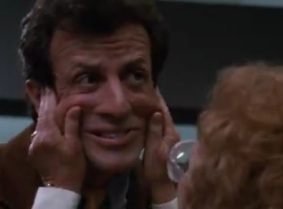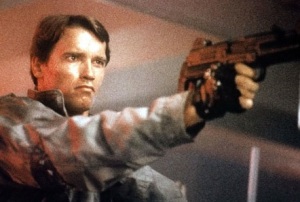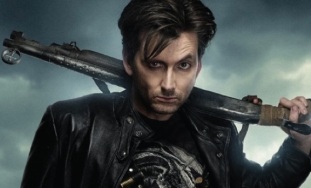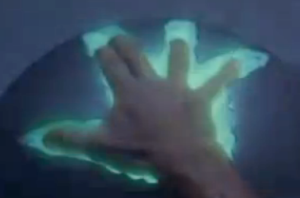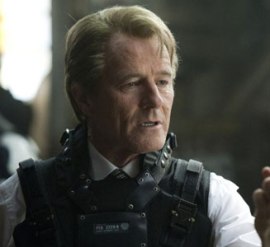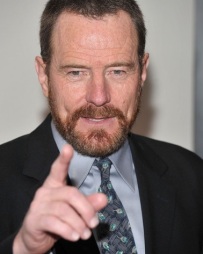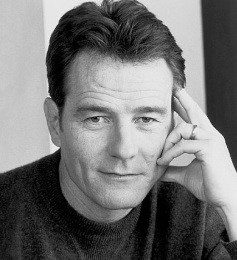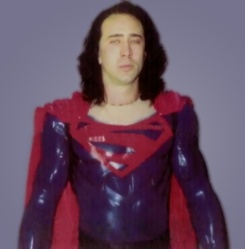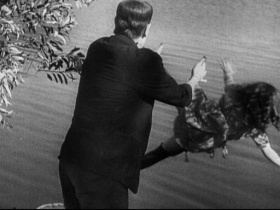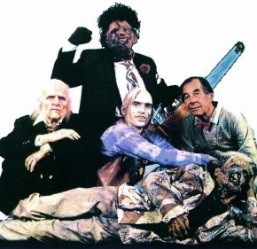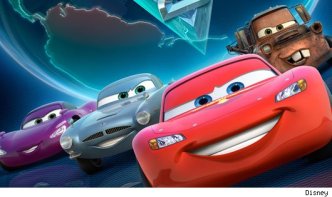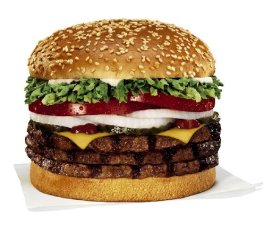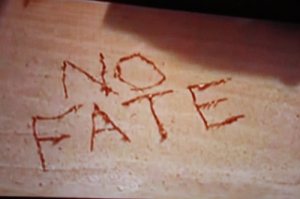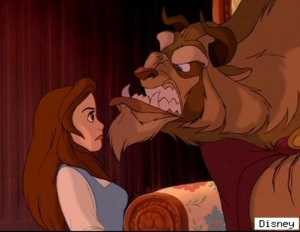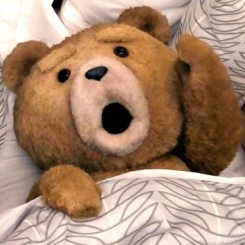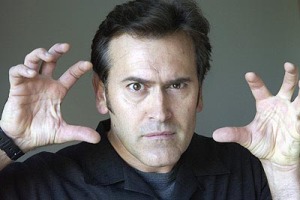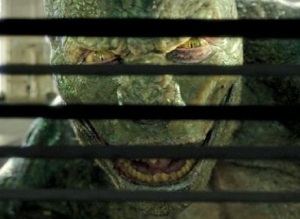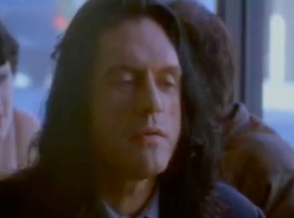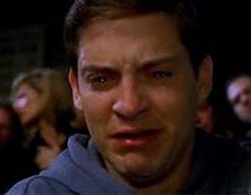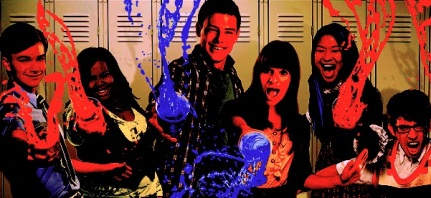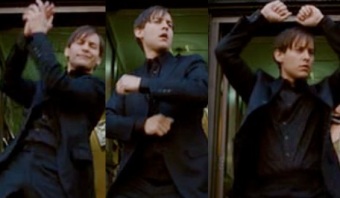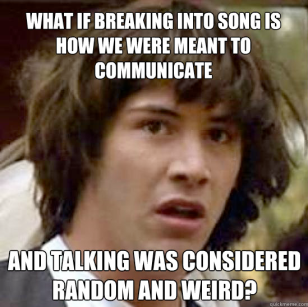
They often say that the third movie is where the series starts to go downhill and boy, does no film exemplify this better than the third installment of the Batman franchise. Nothing manages to outrun the long reach of mediocrity in this film. The story is oversimplified and cliche, there is absolutely zero respect for continuity, and the chilling, dark tone of the first two films is completely thrown out the window in favour of colourful spectacle that does nothing but undermine the integrity of Batman. The characters, who the previous films worked so hard to establish as likeable and worthy of emotional investment, are suddenly reduced to walking parodies of themselves. It’s like Batman is a completely different person and you can forget everything you’ve come to know and like about Harvey Dent because they just seemed to stop caring about how things played out with the character.
And there you have it, my review of Batman Forever.

On an unrelated note, one of you left this on my living room floor.
If nothing else, Christopher Nolan’s reboot of the Batman film series has made any past cinematic blunders with the character seem like a long-forgotten bad dream and the third and final installment The Dark Knight Rises is certainly no exception. I won’t go into a long list of all the things this film does well because its success in many of these areas is expected. By now, Nolan’s Dark Knight films are widely regarded as a near-impeccable blend of action, drama, and comic relief, all of which underlies a story that’s an effective balance of both plot and character drives. They’re highly respectful of the character and tone of Batman, who continues to be portrayed brilliantly by Christian Bale, who continues to make us laugh with his infamous “Bat-voice”. At this stage in the game, to praise The Dark Knight Rises for these triumphs is like praising the sky for being blue – there’s really not much of a point.
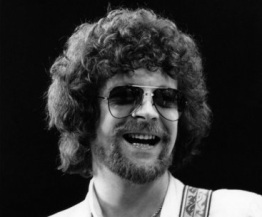
Unless you’re making an ELO record.
Where the film does deserve a lot of praise, however, is in the things it manages to improve upon and the risks it takes. There’s a few obvious improvements such the ditching of the shaky-cam for fight scenes, thus giving the audience much more holistic, less disorienting action sequences. But some much deeper aspects of the film series are improved as well, most notably the dark, realistic tone. The Dark Knight Trilogy has taken great pains over its course to present the concept of Batman as something totally plausible in the real world. Up until this film, this has meant giving the films a gritty, authentic look as well as sparing audiences from some of the more far fetched aspects of the Batman universe such as Killer Croc and “Bat Shark Repellant”. While The Dark Knight Rises continues this tradition, it feels far more topical than the previous films. Perhaps the other two films are also like this and I just didn’t pick up on it, but I really feel like The Dark Knight Rises accurately captures a lot of the anxieties of today’s world, making the film feel that much more realistic. There are some blatant nods to the economic crisis, occupy movement, environmental issues, and so on, but the film also addresses some fears that we perhaps don’t give a lot of thought to such as the digitization of records and societal obsession with information gathering. In fact, a major subplot of the film involves a character trying to obtain a program that wipes all information on her from every database on the planet because she is so restricted by her digital footprint.
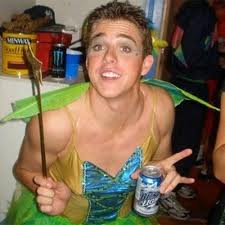
An item that will surely be a hot commodity when all the college students
with Facebook profiles become old enough to run for public office.
Whether this topical realism of the film will severely date it remains to be seen, but for the time being I think it definitely works in favour of the tone the film is trying to maintain.
In terms of risks, I’d argue that Nolan gambles a fair amount with this film. There were times during the preproduction stage of The Dark Knight Rises that felt like a parade of unpopular decisions. I’d heard reservations about everything from the inclusion of Bane as the main villain to the casting of Anne Hathaway to the seeming abundance of Batman rouges (including Catwoman, this film has five) to the increasingly plausible rumour that Bruce Wayne will be killed off. Nolan even goes ahead and includes some things in the film he explicitly stated he never would. Instinct would dictate the film would be a slap in the face to fans of the character and series, but Nolan pulls it all off without a hitch. I personally have come to trust Nolan in respect to creative decision making because if history has proven anything, it’s that the man knows what he’s doing. Now I’m not innocent by any means. I jumped on the “Who the hell is Ra’s al Ghul?” bandwagon in 2005 and the “Heath Ledger as The Joker?!?!?!” bandwagon in 2008, but Nolan has consistently put my skepticism to rest and he continues to do so with this film.
Alright, let’s get to what everyone really wants to talk about: the bad guys. First off, Tom Hardy does an excellent job as Bane. Up until now, most audiences are only familiar with his appearance in Batman and Robin, which reduces him to a moronic, roid-raged minor villain who was only included in the film to cash in on as many Batman characters as possible because, you know, action figures and stuff.
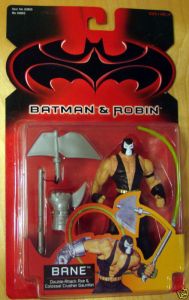
Oh boy! Now I can relive all the disappointment right here at home!
Naturally there was a lot of concern over whether Bane could carry a film as the main antagonist. The Dark Knight Rises is proof that he can, predominantly because the film presents the side of the character most people aren’t aware of. In the comics, despite being strong enough to knock down a building by peeing on it, Bane is actually highly intelligent, conniving, and a master strategist. Most of the antagonists in Nolan’s trilogy are also very cerebral, more focused on breaking Batman’s spirit over his bones, but Bane is one of the only villains in the franchise who can effectively do both. Is he the best baddie of the series? Hard to say. One thing I love about The Dark Knight trilogy is that the villains vary so much in their methods and motivations that it makes comparing them an incredibly difficult task. I will say that Bane is definitely one of the more interesting of the bunch and is up there in terms of dishing out the most damage against Batman, which is at least good enough for this film. Hardy’s performance brings a lot of life to the character and captures his essence beautifully. He especially deserves major props for being able to convey the intense, cunning nature of Bane despite his voice and most of his face being obscured for the film.
Anne Hathaway as Selina Kyle/Catwoman is also a real treat. I will admit that the character seemed a bit shoehorned in at times and the film probably could’ve survived without her. That being said, it wouldn’t have been nearly as strong. While The Dark Knight thrives on moral ambiguity, this film doesn’t hesitate as much in establishing good and evil. Selina brings back that important element of uncertainty as all throughout the film, she sits on the fence like a … dare I say cat? The complex, contradictory nature of the character keeps the audience constantly guessing who she’ll be an asset or liability to next and it works well. People were worried whether pretty-girl Hathaway was up to the challenge, but I was pleasantly surprised. She’s definitely the Heath Ledger of this film in terms of the discrepancy between what was expected of her and what she delivers, which happens to be an excellent performance that probably does the character more justice than any previous cinematic portrayal.
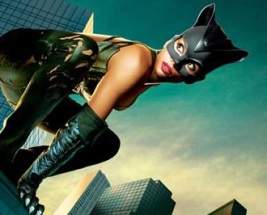
Granted, the bar wasn’t exactly set high.
For all it does well, however, The Dark Knight Rises isn’t perfect and has its share of shortcomings. The main problem is that it’s quite predictable. This isn’t the fault of writing or direction, but rather a problem inherent in the fact that this film is the trilogy’s conclusion. Sort of like how in a prequel, the audience expects certain events and character developments to transpire, the final film of a franchise has to deal with these same inevitabilities. All the loose ends need to be tied up nicely and the characters have to be bid farewell in a manner satisfying to the audience. This presents its own set of minor problems in the film such as the rushing along of certain plot points and the underdevelopment of certain characters, but the main issue is that the audience expects a certain outcome, which renders everything in the film as simply leading up to that inevitable point. This ends up taking a lot of bite out of the film’s developments and twists because they’re reduced from matters of what to matters of how and when. For example, much of the mystery is taken out of new characters such as John Blake (Joseph Gordon-Levitt) and Miranda Tate (Marion Cotillard) because everyone knows that to introduce them in the final film means they must serve some kind of important purpose and because there’s only one film to develop them, it becomes obvious rather quickly what those purposes will be. That all being said, the film does the best it can with this issue and with all that the audience does see coming, it still manages to surprise us in certain places.
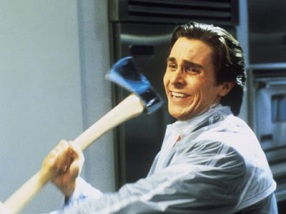
SPOILER: The whole thing was one of Patrick Bateman’s fantasies.
The Dark Knight Rises is a highly satisfying conclusion to The Dark Knight trilogy and gives the series the send-off it deserves. Is it the best of the series? I can’t say, but it wraps everything up very effectively and is anything but an unexciting farewell. A necessary film for any fans of the character and franchise.
I give it 4/5.

